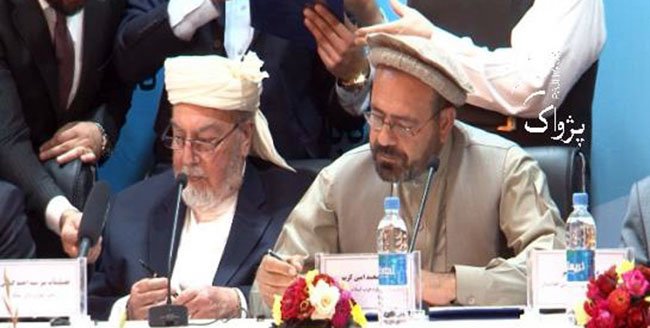Peace talks have been a serious challenge for Afghan administration and came to a standstill in one way or another. The Taliban outfits played a deceptive game and assassinated the head of High Peace Council (HPC) Professor Burhanuddin Rabbani on September 20, 2011 under the terms of negotiation. Moreover, the Taliban fighters continued their militancy and inflicted heavy casualties upon Afghan nation despite the reconciliation process.
With the revelation of the Taliban’s supreme leader Mullah Omar’s demise and the death of his successor Mullah Akhtar Mansour, who was killed in a US drone strike, the peace negotiation reached a deadlock. Following the appointment of Haibatullah Akhundzada as Mansour’ successor, the Taliban orchestrated deadly attacks and intensified their Omari Operation – announced earlier by Mansour – from across the border. After all, Mansour’s death led to the termination of the Quadrilateral Coordination Group (QCG) featuring Pakistan, Afghanistan, China and the United States as Pakistani officials condemned the strike and called it violation of its territory. In short, peace talks were proved abortive and the militancy increased to a great extent.
With the escalation of insurgency in Afghanistan, the Afghan-Pak relations soured and the heads of National Unity Government (NUG) talked in serious tone against Pakistan at NATO summit in Warsaw and believed that Pakistan divided the Taliban into good and bad terrorists. Addressing the United Nation General Assembly (UNGA), the Second Vice President Sarwar Danish also said that the Afghan government wanted the US to mount pressure on Islamabad to eliminate terrorist sanctuaries on its soil and bring the Taliban to the negotiating table. Since the Taliban and al-Qaeda leaders were killed on Pakistan’s soil, Afghan officials and political pundits believe that the Taliban enjoy safe havens across the border and stage fatal attacks against the nation.
It comes as US Secretary of State John Kerry, commended Pakistan’s fight against terrorism few days back, and said that Islamabad and Kabul had a shared interest in peace and security in the region. He added that terrorist infrastructure had been dismantled and they were on the run because of the action taken by Pakistani forces.
In addition, Pakistan’s Adviser to the Prime Minister on Foreign Affairs Sartaj Aziz said, last month, that Pakistan believed that a politically negotiated settlement through an Afghan-owned and Afghan-led peace process was the most viable option for achieving durable peace in the war-torn country. Addressing a reception hosted by the Afghan ambassador on his country’s Independence Day, he said, “Pakistan desires durable peace in Afghanistan and seeking close cooperative relations with Afghanistan have always been a cornerstone of Pakistan’s foreign policy”. Hence, Pakistani officials constantly remarked peace negotiation as viable option for a bona fide peace in Afghanistan – which never came to fruition and brought no changes to Taliban’s strategy towards the country.
Now, Afghan government has signed a peace deal with Hezb-e-Islami Afghanistan (HIA) led by Gulbuddin Hekmatyar – which has triggered a mixed reaction among the nation. A large number of people, including political pundits, express pessimistic opinions about the issue and believe that peace deal with HIA will not mitigate the insurgency and Hekmatyar does not carry much weight since his party has been undermined by the Taliban fighters. The cyberspace is replete with hateful rhetoric against HIA and the militancy and deadly attacks carried out by its fighters leading to heavy casualties. Human Rights Watchdog has also called the peace deal with this party disrespect to human rights adding that it will catalyze the culture of impunity.
However, the officials deem it a fruitful outcome of the government and HPC’s struggles and hope for a decline in insurgency. Expressing optimism in a meeting with US Special Representative for Afghanistan and Pakistan Richard Olson in New York on the sidelines of the UNGA, Sarwar Danish said that the peace deal with HIA was a legal and basic demand of the government and people. He also welcomed HIA’s assurance to cut ties with militant outfits and dismantle its armed wing.
The fact is that reaching a peace deal with HIA will not resolve the political challenges and warring parties, mainly the Taliban who pose the most serious threat to the country, will continue their militancy unabated and casualties will not decline. Perhaps the reason behind this deal for HIA is seeking immunity, after carrying out deadly attacks, and a political authority in the NUG will be most welcome.
Overall, if HIA vows to accept and practice upon Afghanistan’s Constitution, stop acts of violence and uphold democracy, the peace agreement will be a positive step – though it will not resolve the political challenges, dismantling an armed wing is a move toward peace. Similarly, it reveals the fact that the door for peace talks is open for any warring parties and Afghanistan is a peace-maker.
Home » Opinion » The Controversy over Peace Talks
The Controversy over Peace Talks
| Hujjatullah Zia

